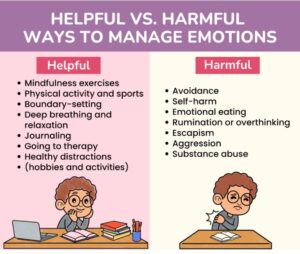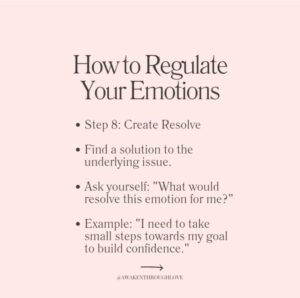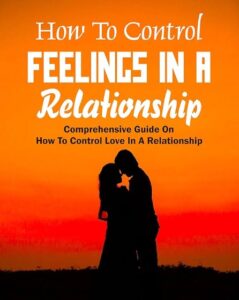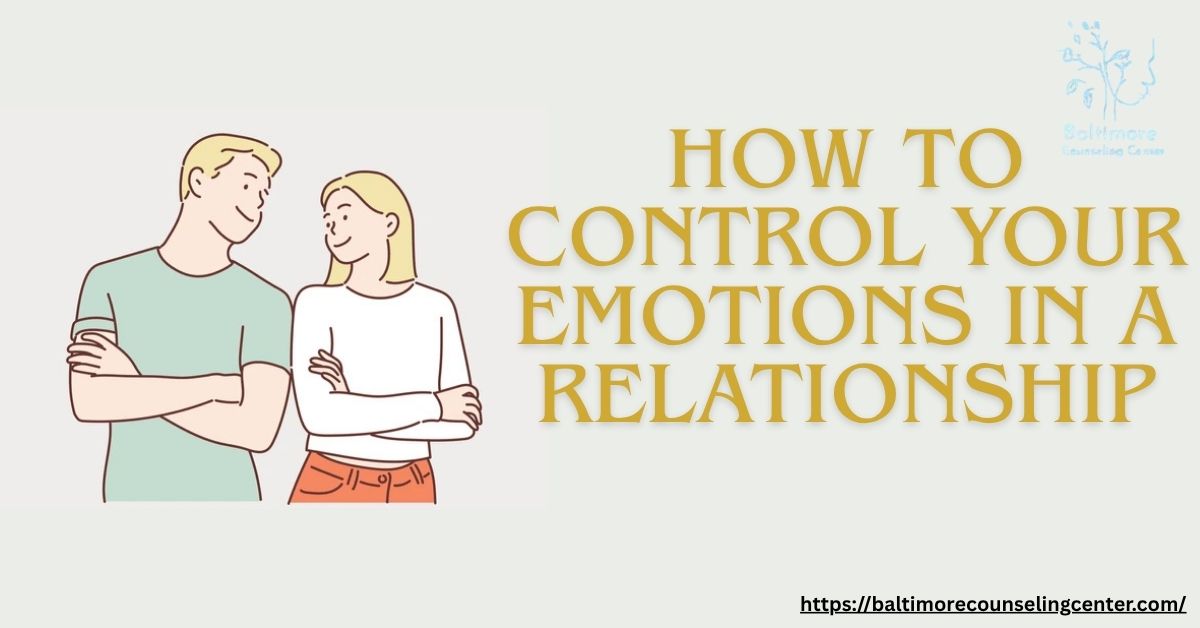Have you ever felt overwhelmed by your emotions in a relationship, leading to arguments or misunderstandings? You’re not alone.
Emotions can be powerful, sometimes taking control of your actions before you even realize it. But imagine the peace and harmony that can come when you master the art of managing these emotions. You can transform your relationship into a nurturing and understanding space, free from the chaos that unchecked feelings can bring.
We’ll explore practical strategies to help you maintain calm and clarity, ensuring your emotions enhance rather than hinder your connection with your partner. Dive in to discover how you can harness the power of your emotions to build a stronger, more fulfilling relationship.
Couples Counseling in Baltimore
Emotional Awareness
Emotional awareness is vital in any relationship. Understanding your feelings helps you respond better. It builds stronger connections and improves communication. Knowing what triggers your emotions can make a difference. Recognizing these feelings is the first step to controlling them. Being aware of your emotions means you can handle them wisely.
Understanding Your Emotions
It’s essential to know what you’re feeling. Are you happy, sad, or angry? Identifying your emotions helps you manage them. You can write them down or talk about them. This practice keeps your emotions in check. It also helps you avoid misunderstandings with your partner.
Recognizing Emotional Triggers
Emotional triggers are events that provoke strong feelings. Knowing your triggers helps you prepare. You can create strategies to deal with them. Discuss these triggers with your partner. This conversation can prevent conflicts. Awareness of triggers also reduces stress.
Practicing Self-reflection
Self-reflection involves thinking about your feelings. Ask yourself why you feel a certain way. This practice deepens your emotional awareness. It helps you understand your reactions. Reflecting on your emotions can improve your relationship. It fosters empathy and understanding.
Communicating Openly
Talk about your emotions with your partner. Open communication builds trust. It allows you to express your feelings clearly. Avoid hiding your emotions. Share your thoughts and feelings regularly. This habit strengthens your bond. Communication is key to emotional awareness.
Using Mindfulness Techniques
Mindfulness helps you stay present. It keeps your emotions balanced. Techniques like meditation or deep breathing are useful. Practice these techniques regularly. They help you manage stress and emotions. Mindfulness improves emotional control.
| Emotional Awareness Techniques | Benefits |
| Understanding Emotions | Prevents misunderstandings |
| Recognizing Triggers | Reduces stress |
| Self-Reflection | Fosters empathy |
| Open Communication | Builds trust |
| Mindfulness Techniques | Balances emotions |
In relationships, emotional awareness is invaluable. It guides you through tough times. Being aware means knowing how to act. It helps you maintain harmony and peace. Aim to grow your emotional awareness daily.
Identifying Triggers
In relationships, emotions can sometimes feel overwhelming. Managing these emotions is key to maintaining harmony. One important step is identifying triggers. Triggers are specific events or behaviors that cause emotional reactions. Understanding these can help you respond calmly and thoughtfully. This self-awareness is crucial for a healthy relationship.
What Are Emotional Triggers?
Emotional triggers are stimuli that provoke a strong emotional response. They can stem from past experiences or personal insecurities. Recognizing these triggers helps you stay in control. Pay attention to moments when your emotions spike unexpectedly.
Anxiety Therapy Counseling In Baltimore
Common Triggers In Relationships
- Criticism: Feeling judged or criticized can lead to defensiveness.
- Neglect: Feeling ignored or unimportant may spark feelings of resentment.
- Jealousy: Fear of losing your partner’s attention can cause anxiety.
- Miscommunication: Misunderstandings often lead to frustration.
How To Identify Personal Triggers
- Reflect on Past Conflicts: Think about arguments or disagreements. What were the common themes?
- Journal Your Feelings: Writing helps uncover patterns. Note what makes you upset or angry.
- Pay Attention to Physical Reactions: Increased heart rate or sweating can signal a trigger.
- Discuss with Your Partner: Open conversations can provide new insights.
Using A Trigger Table
A trigger table can help you organize your thoughts. Below is an example:
| Trigger | Response | Notes |
| Criticism | Defensive | Feel judged, need reassurance |
| Neglect | Resentment | Feel unimportant, need attention |
Benefits Of Identifying Triggers
Identifying triggers can improve your emotional intelligence. It helps you understand your feelings better. This understanding leads to more constructive conversations. You can address issues calmly without overreacting. You build a stronger, more resilient relationship.
Practicing Mindfulness
Relationships can be challenging, especially when emotions run high. It’s essential to manage these emotions to maintain a healthy bond. One effective way to achieve this is by practicing mindfulness. Mindfulness helps you stay present and focused, reducing stress and improving emotional control. By integrating mindfulness into your daily routine, you can enhance communication and understanding in your relationship.
What Is Mindfulness?
Mindfulness involves paying attention to the present moment without judgment. It helps you become more aware of your feelings and reactions. This awareness allows you to respond calmly rather than react impulsively. In relationships, this means listening actively and communicating more effectively.
Anxiety Therapists in Baltimore
Benefits Of Mindfulness In Relationships
- Improved Communication: Mindfulness enhances your ability to listen and express yourself clearly.
- Reduced Stress: Staying present reduces stress and anxiety, fostering a peaceful environment.
- Better Emotional Regulation: You can manage your emotions more effectively, avoiding conflicts.
Simple Mindfulness Exercises
Incorporate these exercises into your routine to cultivate mindfulness:
- Deep Breathing: Take slow, deep breaths to calm your mind. Focus on each breath.
- Body Scan: Pay attention to different parts of your body. Notice any tension and release it.
- Mindful Listening: Listen to your partner without interrupting. Acknowledge their feelings.
Creating A Mindful Environment
Set up a peaceful space at home for mindfulness practice. Use calming colors, comfortable seating, and gentle lighting. This environment will support your mindfulness journey and enhance your emotional health.
Mindfulness And Conflict Resolution
During conflicts, mindfulness helps you stay calm and composed. It allows you to address issues without anger. Practice taking a moment to breathe and collect your thoughts before responding. This approach can transform conflicts into opportunities for growth.
Mindfulness Resources
| Resource | Description |
| Books | “The Miracle of Mindfulness” by Thich Nhat Hanh |
| Apps | Headspace, Calm |
| Online Courses | Mindfulness-Based Stress Reduction (MBSR) |
Communication Skills
Managing emotions in relationships can be tough. Emotions can cause misunderstandings and disagreements. Effective communication skills help avoid these issues. They allow you to express feelings clearly. This builds trust and understanding. You can connect better with your partner.
Listening Actively
Active listening is key. It involves more than hearing words. Pay attention to what your partner says. Show interest in their thoughts. Nod or give simple responses. This shows you are engaged. It makes your partner feel valued.
Expressing Yourself Clearly
Clear expression matters. Avoid vague statements. Use simple words. State your feelings directly. “I feel upset because…” is better than “You always make me upset.” This reduces confusion. It helps your partner understand your emotions.
Using “i” Statements
“I” statements are powerful. They focus on your feelings. Avoid blaming your partner. Say “I feel hurt when…” instead of “You hurt me by…”. This shifts focus to your emotions. It avoids conflict and promotes understanding.
Body Language Awareness
Body language speaks volumes. Be mindful of your posture, gestures, and facial expressions. Crossing arms might signal defensiveness. A relaxed posture shows openness. Eye contact builds connection. It makes communication more effective.
Regulating emotions is crucial. Practice deep breathing or meditation. Pause before reacting. This helps calm your mind. It prevents impulsive reactions. Choose words wisely. This fosters a peaceful exchange of thoughts.
| Skill | Description |
| Active Listening | Focus on the speaker, show engagement. |
| Clear Expression | Use simple, direct language. |
| “I” Statements | Focus on personal feelings, avoid blame. |
| Body Language | Be aware of non-verbal cues. |
| Emotional Regulation | Manage reactions through calming techniques. |
Setting Boundaries
Managing emotions in a relationship is crucial for harmony. One powerful way to do this is by setting boundaries. Boundaries help maintain respect and understanding. They define what’s acceptable and what’s not. This keeps both partners on the same page. Let’s explore how setting boundaries can control emotions effectively.
Understanding Your Limits
Knowing your limits is the first step in setting boundaries. Ask yourself what makes you uncomfortable. Reflect on situations that trigger negative emotions. This self-awareness helps you establish clear rules. Remember, it’s okay to say no. Respect your feelings and needs. Understanding your limits keeps emotions in check.
Communicating Clearly
Clear communication is key to effective boundaries. Express your needs without fear. Use simple words. Be direct about what you expect. Make sure your partner understands your boundaries. Miscommunication can lead to conflicts. Clear communication prevents misunderstandings and emotional turmoil.
Consistency Is Crucial
Consistency strengthens boundaries. Stick to the rules you set. Don’t change them often. This gives your partner a clear idea of your expectations. Inconsistent boundaries cause confusion. Consistency fosters trust and stability. Consistency is crucial for emotional balance in relationships.
Respecting Each Other’s Boundaries
Respect is a two-way street. Honor your partner’s boundaries too. Listen to their needs and concerns. Respect creates a safe space for both. It encourages openness and honesty. Respecting each other’s boundaries nurtures emotional well-being.
Handling Boundary Violations
Sometimes boundaries are crossed. Address violations calmly. Discuss what went wrong. Find solutions together. Don’t let emotions take over. A table below highlights steps for handling boundary violations:
| Step | Description |
| Identify | Recognize the boundary violation. |
| Communicate | Talk about the issue openly. |
| Resolve | Work together to find a solution. |
| Reaffirm | Restate the boundary for future reference. |
Handling violations carefully ensures emotional control.
Benefits Of Setting Boundaries
Setting boundaries offers many benefits. It reduces stress and anxiety. It improves relationship satisfaction. It helps maintain emotional health. Boundaries protect your personal space. They enhance mutual respect and understanding. The benefits are numerous and impactful.
Healthy Coping Mechanisms
Emotions in a relationship can be intense. They can bring joy or cause tension. Understanding how to control these emotions is crucial for a healthy relationship. Healthy coping mechanisms help you manage feelings effectively. They enable you to communicate better with your partner. This section explores various strategies to maintain emotional balance.
Practice Mindfulness
Mindfulness helps you stay present. It allows you to observe your emotions without judgment. This practice involves deep breathing and focusing on the moment. Regular mindfulness exercises can reduce stress. It helps you respond calmly to relationship challenges.
Express Emotions Constructively
Sharing feelings is important in a relationship. Use “I” statements to express emotions. For example, say “I feel” instead of “You make me feel”. This approach reduces blame. It encourages open dialogue. Constructive expression fosters understanding between partners.
Maintain A Journal
Writing in a journal is therapeutic. It helps you reflect on your thoughts and emotions. Journaling allows you to process feelings privately. This can lead to better emotional clarity. A clear mind improves communication with your partner.
Use Physical Activity
Exercise is a powerful tool for emotional control. Physical activity releases endorphins. These chemicals boost mood and reduce stress. Regular exercise can stabilize emotions. It enhances mental health and relationship well-being.
Seek Support
Sometimes, emotions can be overwhelming. Talking to a friend or therapist can help. Support systems provide perspective. They offer guidance in managing emotional struggles. Seeking support shows strength and dedication to self-care.
Practice Self-care
Self-care is essential for emotional balance. Engage in activities that you enjoy. Prioritize rest and relaxation. Eating well and sleeping enough are vital. A healthy lifestyle supports emotional regulation. It helps maintain harmony in relationships.
| Coping Mechanism | Benefits |
| Mindfulness | Reduces stress, improves response to challenges |
| Constructive Expression | Fosters understanding, reduces blame |
| Journaling | Enhances clarity, aids in reflection |
| Physical Activity | Boosts mood, stabilizes emotions |
| Support Systems | Provides perspective, offers guidance |
| Self-Care | Maintains balance, supports regulation |
PTSD Treatment in Baltimore
Seeking Support
Maintaining emotional balance in a relationship is vital. Emotions can often become overwhelming. Seeking support is crucial during such times. It provides guidance and comfort. You don’t have to manage emotions alone. With the right support, emotional control becomes easier.
Talking To Friends
Friends offer a listening ear. They understand you and your emotions. Sharing feelings with friends can bring relief. It helps in gaining new perspectives. Sometimes, friends can provide valuable advice. They know you well and can offer insights.
Family Support
Family can be a strong support system. They care deeply about your well-being. Sharing your emotions with family members can be comforting. They can provide unconditional love and understanding. Family can also offer practical solutions to emotional challenges.
Professional Help
Sometimes, professional help is needed. Therapists and counselors are trained to help. They can guide you through emotional struggles. Seeking professional help is not a sign of weakness. It shows strength and willingness to improve.
Support Groups
Support groups are valuable resources. They connect you with people facing similar challenges. This shared experience can be comforting. It helps to know you’re not alone. Support groups provide a sense of community and belonging.
Online Communities
Online communities offer a vast network. They are accessible and diverse. You can share your experiences and get support. Online platforms often have anonymity. This can make it easier to open up and share emotions.
Self-help Resources
Books, podcasts, and articles are useful self-help resources. They offer strategies to manage emotions. Self-help materials can be accessed at your convenience. They empower you to take control of your emotional journey.

Emotional Regulation Techniques
Emotions can often feel overwhelming, especially in relationships. Navigating these emotions is crucial for maintaining harmony and understanding. Emotional regulation techniques offer valuable tools to help manage feelings effectively. These methods can lead to healthier communication and deeper connections.
Identifying Your Emotions
Begin by recognizing what you’re feeling. This awareness is the first step in managing emotions. Use a journal to write down feelings and thoughts. Reflect on what triggers your emotions.
Breathing Exercises
Deep breathing can calm your mind. Practice inhaling deeply through your nose, holding for a few seconds, and exhaling slowly. Repeat this process to relieve stress and gain clarity.
Mindful Meditation
Spend a few minutes each day in meditation. Focus on your breath and let thoughts pass without judgment. This practice can increase self-awareness and emotional stability.
Positive Self-talk
Challenge negative thoughts. Replace them with positive affirmations. Remind yourself of your strengths. Encourage yourself with kind words.
Using A Stress Ball
A stress ball can physically relieve tension. Squeeze it whenever emotions feel intense. This simple act can help channel stress into a manageable form.
Creating An Emotional Response Table
| Emotion | Trigger | Response Technique |
| Anger | Criticism | Deep Breathing |
| Sadness | Disappointment | Positive Self-Talk |
| Anxiety | Uncertainty | Mindful Meditation |
Define what is acceptable for you. Communicate these boundaries clearly. Respecting limits can prevent emotional turmoil and enhance mutual respect.
Reflective Listening
Listen actively to your partner. Repeat back what you’ve heard to confirm understanding. This technique fosters empathy and reduces emotional conflicts.
Seeking Professional Help
Consulting a therapist can provide personalized guidance. They can offer strategies tailored to your needs. Professional support can be invaluable in complex emotional situations.
Using A Support Network
Lean on friends and family for support. Sharing experiences can provide comfort. A strong support system can help navigate emotional challenges.
Building Trust
Building trust is a crucial part of any relationship. It lays the foundation for a strong, lasting bond. Trust helps partners feel safe and respected. Without it, misunderstandings and conflicts can arise. Controlling your emotions in a relationship becomes easier with trust. It allows open communication and understanding. Trust acts as a buffer during tough times. Let’s explore how to build this essential element in your relationship.
Understanding Each Other’s Needs
To build trust, partners must understand each other’s needs. This involves listening actively and showing empathy. Ask questions to learn what matters to your partner. Create a safe space for open dialogue. This encourages honesty and transparency.
- Listen actively: Pay attention to words, tone, and body language.
- Show empathy: Try to see things from your partner’s perspective.
- Ask questions: Seek to understand rather than to respond.
Consistency In Actions
Consistency builds trust over time. Align your actions with your words. Be reliable and dependable. This creates a sense of security.
| Action | Effect |
| Keeping promises | Strengthens trust |
| Being reliable | Builds confidence |
Open Communication
Open communication is key to trust. Share your thoughts and feelings honestly. Use “I” statements to express your emotions. Avoid blame or accusations. This fosters a healthy exchange.
- Express feelings: Use clear and simple language.
- Use “I” statements: Focus on your perspective.
- Avoid blame: Discuss issues without pointing fingers.
Respecting Boundaries
Respect is vital for trust. Every individual has personal boundaries. Recognize and honor these limits. Discuss boundaries openly. This helps avoid misunderstandings.
Respecting boundaries shows care and consideration. It strengthens the emotional bond. Trust flourishes in such an environment.

Cultivating Empathy
Relationships thrive when both partners understand each other’s feelings. Cultivating empathy plays a crucial role in this. It helps to see things from your partner’s perspective, making the bond stronger. Emotions can be overwhelming, but empathy paves the way for calm and understanding. Let’s dive into how empathy can transform your relationship.
Cultivating Empathy: Understanding Your Partner’s Emotions
Empathy involves recognizing your partner’s emotions. Listen actively to what they say. Pay attention to their body language and tone. This helps you grasp their feelings better.
- Active Listening: Focus entirely on your partner when they speak.
- Body Language: Notice their gestures and facial expressions.
- Tone of Voice: Understand the emotion behind the words.
Empathy In Action: Practical Steps
Empathy is not just about understanding. It’s also about responding thoughtfully. Show genuine concern for your partner’s feelings. Offer comfort when they are upset.
- Acknowledge Feelings: Let your partner know you understand their emotions.
- Express Concern: Show care and willingness to help.
- Provide Support: Be there when your partner needs you.
Empathy’s Benefits: Strengthening Bonds
Empathy strengthens relationships. It builds trust and closeness between partners. When you empathize, your partner feels valued and understood.
| Benefits | Details |
| Trust | Empathy fosters a safe environment. |
| Closeness | Understanding leads to deeper connections. |
| Valued | Your partner feels respected and heard. |
Empathy Challenges: Overcoming Barriers
Empathy isn’t always easy. Personal biases and stress can hinder it. Recognize these barriers to improve empathetic skills.
- Bias Awareness: Identify personal prejudices.
- Stress Management: Control stress to enhance empathy.
ADHD Treatment in Baltimore
Reflection And Growth
Controlling emotions in a relationship can be challenging. Feelings can be overwhelming. But reflection and growth can help. They open paths to understanding ourselves and our partners better. This process, while not easy, fosters healthier relationships. It encourages us to look within and learn from past experiences. Through reflection, we gain insights into our emotional responses. Growth follows as we apply these insights to improve our relationships.
Understanding Your Emotional Triggers
Identifying what sets off strong emotions is crucial. These triggers can be events, words, or behaviors. Make a list of situations that spark intense feelings. This helps in recognizing patterns. Understanding triggers helps in preparing for emotional responses. It provides a chance to pause before reacting.
Self-reflection Techniques
Spend time alone to think deeply. Journaling is a helpful tool. Write about your feelings and experiences. Consider using meditation as a way to clear your mind. Reflect on past conflicts. Ask yourself questions. What did you learn? How did you react? Use these reflections to gain insights.
Setting Personal Goals For Emotional Growth
Growth requires setting goals. Decide what emotions you want to manage better. Create a plan with small steps. Use bullet points to outline your goals:
- Identify negative emotional patterns
- Practice calm responses
- Seek feedback from your partner
- Celebrate small successes
Maintaining Open Communication
Discuss your emotions openly with your partner. Use “I feel” statements. This avoids blame. It helps partners understand each other better. Open communication builds trust. It supports mutual growth.
Learning From Past Experiences
Reflect on past relationship challenges. What worked? What didn’t? Use these lessons to guide future actions. Create a table to compare past responses:
| Situation | Emotional Response | Outcome | Lesson Learned |
| Disagreement on finances | Anger | Argument | Discuss calmly and plan together |
| Forgot anniversary | Sadness | Distance | Communicate feelings early |
Embracing Change
Growth demands change. Accept changes in yourself and your partner. Be open to new ways of thinking. This can strengthen your bond. Change is a sign of maturity and understanding.

Medication Treatment
Frequently Asked Questions
How To Stop Being So Emotional In A Relationship?
Practice mindfulness to manage emotions effectively. Communicate openly with your partner about feelings. Set healthy boundaries to maintain balance. Focus on self-care and prioritize personal well-being. Seek professional help if needed to gain deeper insights and strategies.
How To Stop Emotional Outbursts?
Practice deep breathing to calm your mind quickly. Identify triggers and develop coping strategies. Regular physical exercise helps reduce stress levels. Communicate feelings openly before they build up. Seek professional help if needed.
How To Control Feelings For Someone You Love?
Focus on self-awareness and understand your emotions deeply. Practice mindfulness to stay grounded and balanced. Set healthy boundaries to manage your feelings effectively. Engage in activities that distract and uplift you. Communicate openly about your emotions with trusted friends or a therapist to gain perspective and support.
Conclusion
Managing emotions in a relationship takes practice and patience. Start with small steps each day. Listen carefully to your partner. Speak honestly about your feelings. Take deep breaths when feeling upset. Pause before reacting. This helps you think clearly. Choose your words wisely.
Remember, understanding and kindness build strong bonds. Keep learning and growing together. Support each other in tough times. Celebrate the joyful moments too. Building emotional control strengthens your connection. A happy relationship needs effort from both sides. Stay committed to this journey.
Your relationship will flourish with love and respect.

